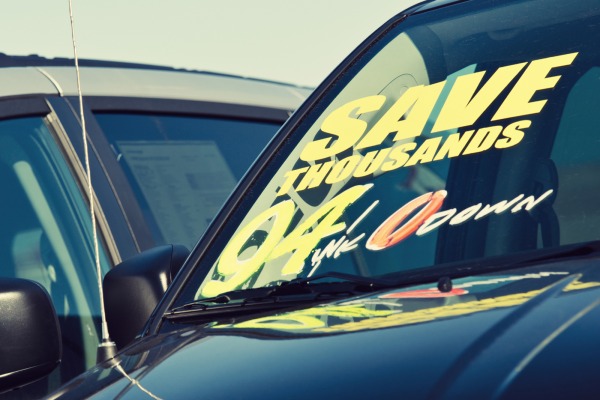
A Los Angeles man thought he was getting a bargain when he negotiated a good price for what appeared to be an intriguing "demo" car: a late-model BMW 5 Series with 10,000 miles on the odometer. He was about to sign the sales contract when the dealer pushed a disclaimer toward him. Reading the fine print, he learned that BMW had used the car on a racetrack for a high-performance driving school. The buyer backed out.
Stories like this underscore the importance of verifying the history of any demo car, particularly one that has a significant number of miles on it. If it truly is a "demo," or demonstration car that's only used for giving test-drives at the dealership, it could be a good way to save some money on a nearly new car. But shoppers need to do extra research to make sure they really are getting a good deal.
Definition of a Demo Car
Car dealerships use demo cars for test-drives when popular new models are in short supply, explains Chris Cutright, a former car salesman. Often, the dealership's managers also use demo cars for commuting. However, dealers do not register demo cars, so the vehicles are considered new. When their dealership duties are over, the cars go up for sale with between 1,000 and 3,000 miles on their odometers.
Demo cars either come from the dealership's own inventory or the used-car manager purchases them at auction, Cutright says. Demos shouldn't be confused with what are called "program" cars, which are driven by manufacturer representatives and then distributed to dealers to sell, with as many as 10,000 miles on the odometer. The BMW 5 Series mentioned earlier was, technically speaking, a program car.
"Buying or leasing a demo car can be a great deal, if the price is right," says Dennis Rayfield, the former fleet manager for a Hollywood talent agency who now works for Edmunds giving car buying advice to consumers via the Live Advice service. In some cases, he purchased these cars for his clients to save money. In other cases, he bought demos because he couldn't find a car with the options and features a client wanted in the dealership's regular inventory.
Buying a demo car is a good "potential" opportunity, stresses Oren Weintraub, president of Authority Auto, a car buying service in Sherman Oaks, California. But here's the key, Weintraub says: Is the dealership willing to give you a good price? A demo car is not automatically a low-priced car, he says.
Cutright agrees. While demo cars offer the chance for a bargain, a smart shopper can often do just as well buying a new car. With manufacturer incentives, special leases and smart negotiating, "you don't have to mess around with things like buying a demo," he says.
Still, because a demo car is a new car with some miles and a little wear and tear, the savvy shopper can press for a good deal. However, the experts say to keep these points in mind:
Verify the car's history: Ask the salesperson for details about the car's use. Also, request a vehicle history report and read it carefully. Otherwise, like the Los Angeles car buyer who almost bought a BMW that had been on a racetrack, you could miss something important.
Check the warranty: Ask the salesperson to provide proof of the in-service date, which is when the warranty begins. The in-service date is usually the date on which the buyer purchased the car. But the in-service date could be earlier if the dealership uses the car as a demo. Unless the dealer extends the car's warranty, the buyer misses out on what could be months of coverage. If the warranty has already started to run and the dealer isn't willing to extend it, ask for a lower purchase price.
Do a new-car cost comparison: Get a price quote for the demo car from the dealer and then look up the cost of a comparable new car. Make sure you review the True Market Value (TMV®) price of the new car and include any incentives and rebates. Then ask yourself if you are really saving enough money on the demo car to justify the other factors such as the wear and tear, miles and shortened warranty.
Price the demo: There is no official way to price a demo car. But the pricing experts at Edmunds recommend that you use this method to arrive at an approximate value:
1. Calculate the TMV price for a comparably equipped new vehicle of the same make, model and style.
2. Apply any new car incentives or rebates being offered for that make, model and style. Consult our Incentives and Rebates section to determine if any are currently available for the vehicle you're considering.
3. Deduct at least 20 cents for every mile the car has been driven. This figure is compensation for the mileage driven and also for wear and tear on the vehicle.
Check the condition: Salespeople use demo cars for test-drives, and the tight quarters of dealership car lots are notorious for producing dings and scrapes on cars. That's why it's important to check any demo car for damage. Ask the salesperson if the vehicle has had any bodywork or painting.
Cutright offers one more note of caution. Some salespeople might offer a demo car and make a shopper think he's getting an inside deal. But if you take the time to check pricing and run a comparison, you might just find out that the demo "isn't any less than a brand-new car they just got off the truck," he says.
Take the time to run the numbers on a demo car. Then you will know for sure if it's saving you money or not.